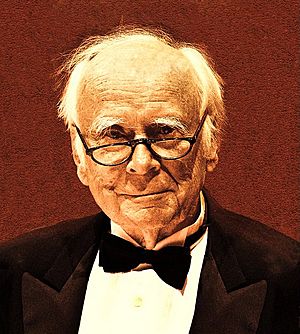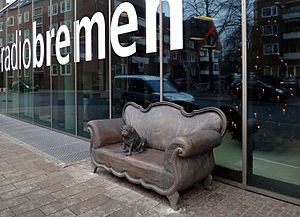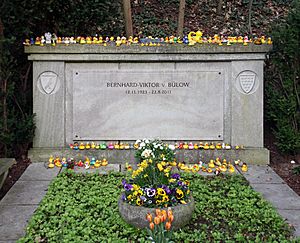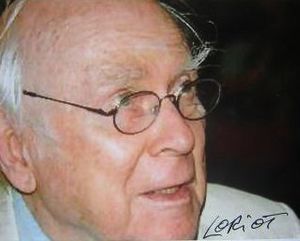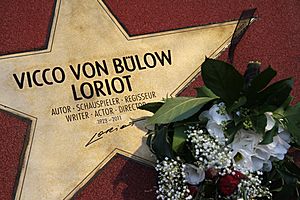Loriot facts for kids
Quick facts for kids
Vicco von Bülow
Loriot |
|
|---|---|
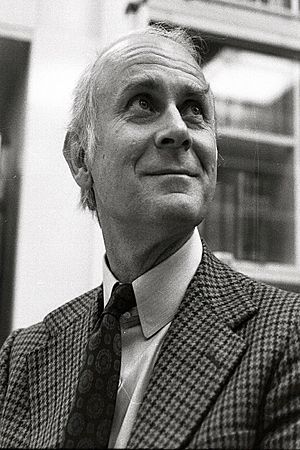
Vicco von Bülow, 1971
|
|
| Born |
Bernhard-Viktor Christoph-Carl von Bülow
12 November 1923 Brandenburg an der Havel, Prussia, Weimar Republic
|
| Died | 22 August 2011 (aged 87) |
| Known for | Ödipussi, Pappa Ante Portas |
| Signature | |
Vicco von Bülow (born November 12, 1923 – died August 22, 2011) was a famous German comedian, artist, and writer. Many people knew him by his stage name, Loriot. He was super famous for his funny cartoons and TV shows. He also made two popular movies, Ödipussi (1988) and Pappa Ante Portas (1991).
Loriot was so well-loved that he was voted one of the best Germans ever in a TV show called Unsere Besten (Our Best). In a special comedy episode, he was even named the most famous German comedian of all time!
Contents
Early Life and Family
Vicco von Bülow was born in Brandenburg an der Havel, a city in what was then Prussia. Today, this area is part of north-eastern Germany. His family, the von Bülows, were part of the German nobility.
When Vicco was very young, his parents separated. His mother sadly passed away when he was just six years old. Because of this, Vicco and his brother grew up in Berlin with their grandmother.
School and Military Service
Vicco was still in school when World War II began. After finishing school early, he joined the military, following a family tradition. He served on the Eastern Front for three years. He was recognized for his bravery and received the Iron Cross. His younger brother was killed in the war shortly before it ended. Later in life, Loriot expressed deep regret about Germany's role in world history during that time.
In 1946, after the war, Vicco finished his final school exams. In 1951, he married Romi Schlumbom, and they had two daughters together.
Loriot's Artistic Journey
Vicco von Bülow showed a great talent for drawing even when he was in school. After the war, he studied graphic design and painting in Hamburg. In 1950, he started publishing his cartoons using the name "Loriot." This name comes from the French word for "oriole," which is a type of bird. An oriole was also on his family's coat of arms.
Wum the Cartoon Dog
In 1971, Loriot created a cartoon dog named Wum. Loriot even did Wum's voice himself! Wum became the official mascot for Aktion Sorgenkind, a German charity that helps people in need.
Wum became super popular, especially when his song "I wish I had a little kittycat" became a number one hit in Germany in 1972. Wum also appeared on a German TV show called Der Große Preis (The Big Prize) for many years. Later, Wum was joined by an elephant named Wendelin and an alien called Blauer Klaus. Loriot wrote, drew, and voiced all these characters himself. Each cartoon ended with Loriot encouraging viewers to join a lottery to support the charity.
The Loriot TV Series
The first episode of Loriot's famous German TV comedy series, also called Loriot, aired in 1976. In six episodes, Loriot performed funny sketches, often playing the main character himself. He also showed short cartoons that he had drawn. Some of his most famous sketches include "The lottery winner" and "yodeling diploma."
Love for Music and Opera
Loriot really loved classical music and opera. In 1982, he led a funny concert to celebrate the 100th birthday of the Berlin Philharmonic Orchestra. He even had a distant family connection to the orchestra's first conductor! Loriot also performed a funny version of Camille Saint-Saëns's The Carnival of the Animals with musicians from the Berlin Philharmonic.
Loriot also directed operas, like Martha in 1986 and Der Freischütz in 1988. He received many awards for his work in TV and movies. In 2001, he received an honorary doctorate degree. He was also made an honorary citizen of his hometown, Brandenburg an der Havel, and his chosen home, Münsing. Loriot passed away in 2011 at Lake Starnberg due to old age.
Loriot's Unique Humor
Loriot's cartoons were funny because of the contrast between the serious situation and the dignified way his characters acted. His characters often had big noses! The humor also came from the clever captions he wrote for his drawings.
Loriot was incredibly popular, and his smart use of language and high-brow comedy led to many of his phrases becoming common in everyday German speech. Some famous examples include the "yodeling diploma" and the "stone louse." People also often quote lines like, "Please... don't talk right now," or "There used to be more tinsel!" His humor was truly special and made a lasting impact.
Awards and Honors
Loriot received many important awards and honors throughout his life for his amazing work. Here are some of them:
- 1943: Iron Cross (1st and 2nd Class)
- 1968 & 1973: Adolf Grimme Award in silver
- 1973: Goldene Europa
- 1974: Grand Merit Cross of the Federal Republic of Germany
- 1974: Karl-Valentin Medal
- 1978: Goldene Kamera
- 1980: Bavarian Order of Merit
- 1985: Kassel Literary Prize
- 1988 & 1993: Bambi
- 1990: Order of Merit of Berlin
- 1993: Membership in the Bayerische Akademie der Schönen Künste
- 1993: Honorary citizenship of his native home town of Brandenburg an der Havel and his chosen home town of Münsing
- 1995: Bavarian Maximilian Order for Science and Art
- 1997: Membership in the Academy of Arts, Berlin
- 1998: Grand Merit Cross with Star
- 2001: Honorary degree from the University of Wuppertal
- 2003: Honorary professorship at the Berlin University of the Arts
- 2007: German Comedy Awards Honorary Award
- 2007: Wilhelm Busch Prize
- 2009: Honorary Award of the Deutsche Filmakademie
- 2009: Walk of Fame of Cabaret
- 2010: Honorary membership in the German Sociological Association
- 2011: Charity stamps of four well-known Loriot cartoons
- 2015: Hörzu readers' award for "greatest TV legend"
See also
 In Spanish: Vicco von Bülow para niños
In Spanish: Vicco von Bülow para niños


